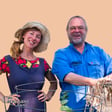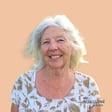
Never Totally Lost with Tristan Gooley
Couldn't find your way out of a cardigan? Get into natural navigation with Tristan Gooley, award winning and bestselling author, expedition leader, and nicknamed “The Sherlock Holmes of Nature” by the BBC.
What I love about Tristan is that he is first and foremost a practitioner of fun, about how great it feels to notice nature’s signs and clues, about the fizzy thrill of uncorking our ancestral problem solving skills.
If you, like me, long to read the landscape and find your way through nature, Tristan’s books and courses will be your faithful guides.
I particularly loved his podcast The Pursuit of Outdoor Clues, which, in just six episodes, soothed my jangled nerves and taught me so much about nature’s whispers.
I’ll leave you to explore Tristan’s back catalogue if you haven’t already – and maybe we’ll run into each other in his online Natural Navigation course?
Tristan’s Natural Navigator courses
Tristan’s podcast ~ The Pursuit of Outdoor Clues
Get on Tristan’s mailing list!
Thinking Fast & Slow ~ Daniel Kahnemann
Kathy Holowko ~ Artist + supporter



















